The Thackery Journal Read online
Page 2
Miles moved forward shaking his head. His brother placed his hand upon his arm, attempting to restrain him. Miles looked up and glared at his brother. He angrily shrugged the hand away. “I may not fully understand everything Mr. Thackery. As you say I am young, and perhaps, therefore, I do not possess the wisdom of those older than myself, but I can recognize the signs. I can see what is happening all around me.” He paused for a few moments. “I am no ostrich,” he continued. “I do not bury my head in the sand as some others do.” He looked towards his brother. Henry said nothing, and merely looked down at the floor.
Thackery did not want to think about a war. He had been involved in the last one against Mexico back in 1848. He had been badly wounded in that conflict. He had not fully recovered, and still walked with a pronounced limp. It was only thirteen years ago,he did not need another war, not quite so soon. The Country did not need another war. Deep down though, he knew that Miles was absolutely correct. The war was coming, and it would come quite soon. He also knew that if it came – when it came – it would be quite different to the last conflict. This would be a civil war, the worst kind of war any Country could wage, fighting against itself. There could be no winners in such a war, everyone lost. He did not want to think about it. Perhaps he was one of those ostriches with its head firmly in the sand that Miles spoke of. If so, then so be it. If the war is coming there is nothing we can do to stop it.
“There will be no war,” he repeated once again. “So let there be no more talk of it.” He placed his hand on Miles shoulder and smiled.
Miles looked down at the floor, shuffling his feet. He then looked up at Mrs. Thackery. “It is not I that is saying the war will come, you understand,” he continued. “But it is the talk of the town.” Henry glared at him, but still said nothing. He was trying very hard to think of a way to change the subject, to lighten the mood.
“Well even if it is,” Emily replied quickly. “We are not going to talk about it anymore, on such a lovely day as this. Are we Aaron?” She started to laugh, as she fanned herself once again.
A war between the States was unthinkable, and yet there was talk, a lot of talk, he knew that. He looked at Miles. Many others thought exactly like Miles. Why even his own son Jacob had spoken about the possibility of a war.
“That is absolutely right, my dear,” he replied. “It is too nice a day. And you are much too pretty to worry about such things anyway.”
Suddenly music could be heard coming from the adjoining room. He looked in the direction of the music, and then turned to face his wife again. He took her hand. “Excuse us, gentleman,” he said, bowing his head low. “Emily this is our dance I believe.” She nodded, and curtsied to the two brothers, and Aaron led her from the room.
* * *
Emily Marshall - 1826
He had first met Emily Marshall when she was only eighteen years old, and he was twenty-two. It was at one of those functions that the Gardiners were always holding. Funnily enough, he hadn’t meant to go. He hated those occasions. They were all too formal for his liking. However he had been persuaded to go at the last moment.
He thought she was the prettiest thing he had ever seen, with her soft curls, blue eyes, and wearing that blue crinoline dress. He was smitten; there was no other word for it. The attraction was mutual but it was to be another six years before they were married. Aaron was twenty-eight years old, and Emily was twenty-four. It was to be the social event of the year, and guests came from all over.
* * *
Thackery placed his hand over the image. “Emily,” he cried out once more. “Why did you leave me? Why did you have to die?”
He looked back at the watch, and slowly closed the case. “Eleven o’clock,” he whispered. It was much later than he had thought. He had been seated there, reading the document, since just after eight thirty. He had read it over and over, trying to make sense of it. He was none the wiser. It made no sense. No sense at all. Why had it happened? Why hadn’t he just come home? Why had he got involved? Why had things gone so badly wrong? “Why? Why? Why?” he stammered. The man shook his head. He knew that he would never know the answers to these questions.
Things had been so different at the beginning of the war.
* * *
Chapter Two
Shattered Dreams
Certainly things had been different then. Things had been so full of promise and expectation. Everyone had been so excited. Everyone had been so proud. It was a just cause they said, a worthwhile cause. Right was on their side.
The elderly man shook his head. No, he murmured. No, it wasn’t worthwhile. It had never been worthwhile. It had been pointless, and futile. All had come to nothing. Unfulfilled promises and shattered dreams, nothing more. Shattered dreams, and shattered lives.
“All of those dead young men,” he whispered, as he stared into the darkness. “Young men from both sides, north and south.” His eyes glazed, and his voice began to falter. Tears ran down his cheek. “Husbands, fathers, brothers,” he hesitated. “… and sons.”
The dog stood up and walked over to his master and nuzzled his face into the man’s hands, gently licking them with its tongue. The man absentmindedly patted the dog’s head. After a few moments the dog returned to its spot by the fireside. It lay down, curled up, and very soon fell back to sleep.
The man reached over to the table at his side, and picked up a brandy glass. He took a large drink, and replaced the glass on to the table. He turned the document over, back to the front page, and started to read it through once again.
“The Journal of Captain Jacob Thackery, of the Army of the Confederate States of America.” He placed his hand over the name and gently ran his fingers over the page. “Jacob,” he called out. “What happened?”
* * *
“Jacob,” he called out. “What happened? Where were you?”
Jacob looked down, shuffling his feet.
“Well, speak up boy,” his father continued. “Where were you? Out with it.”
Jacob continued staring at the ground. “I was with Miles,” he replied, barely audible. “Miles Drew.”
“What did you say, Jacob?” his father said. “Speak up.”
Jacob watched in horror as his father started to slowly tap his fingers on the left side of his face, a sure sign of his displeasure.
“I said I was with Miles,” Jacob repeated, louder this time. “You know Miles, Miles Drew.”
Aaron glared at his son. “I know who Miles is,” he said dismissively, the tapping becoming slightly faster. His son was being devious, secretive. Something had happened. That much was certain. The boys face was flushed, as it always was when he tried to hide something. Aaron was determined to find out what it was. He stopped tapping and moved closer towards his son.
“Look at me boy,” he said, as he grasped the boy’s chin, forcing his head up. Then he noticed the discoloration to the skin. “What’s that bruising on the side of your face?”
Jacob pulled away. “It’s nothing sir, I just tripped and fell, that’s all.” He looked up at his father. The tapping had re-commenced. “It was a simple accident, sir, nothing more. It’s nothing, nothing at all.” His voice trailed away.
Then his father noticed more bruising, this time on the boy’s knuckles. “Not so,” he retorted. “You didn’t just trip and fall. You have been fighting haven’t you? Who were you fighting with?”
Jacob looked at his father, hesitant. I could never fool him, he thought. He always knows when I’m lying. “Miles,” he replied finally. “I’ve been fighting with Miles.”
His father was puzzled. Miles was his son’s best friend. They had never fought in the past. They would never fight. They were inseparable. Why Miles was like a brother to Jacob. Something was not quite right. He moved his hand away from his face, and placed it gently on to Jacob’s shoulder. “Miles did you say? Why on earth would you fight with Miles?”
Jacob said nothing for a few moments. Then he took a deep breath. “This
war that they are all talking about,” he replied. “We had a fight about the war. Miles said that the whole idea of the South going to war against the Union was stupid. The South would be crushed in no time.” He paused for a few moments, and looked down at the floor. “He said that it would be foolish for the South to even consider fighting. They had no chance, no chance whatever.” He looked back up at his father. “Then he said that it was a pointless struggle anyway, and that he would not fight for the South. He said that if war did come, he would join the Union Army.” Jacob paused for a few moments, and took another deep breath. “I just lost my temper, and hit him. Hit him hard.”
Aaron tried to keep from smiling. He put his hand up to his mouth, and started to cough trying not to laugh. “Oh I see,” he said. So the divisions were already starting. First dividing friends, next it would divide families. Brother against brother; father against son. Then, it will split the Country, and tear it apart.
He looked at his son. “Jacob, no matter what happens, just remember that friendships are important.” He hesitated. “This war, if it comes.” He paused for a moment. “When it comes, it will last a few months, a year maybe. Perhaps two, then it will all be over.” He moved closer to his son, and placed his arm around his shoulder. “Friendships are forever, remember that,” he said gently. “You and Miles should make up, and accept your differences.”
Certainly they should make up. There was no question about that, his father was absolutely correct. But there had been no opportunity. Miles had stormed off without another word. He hadn’t seen him since. There had been no reconciliation. Jacob looked up. “We already have made up, sir,” he lied.
His father stared at him. He knew that his son was not telling the truth.
* * *
“Jacob,” he whispered. “Jacob, you lied to me. Why?” More tears ran down his cheeks. His gaze returned to the document, “The Journal of Captain Jacob Thackery.”
The Thackery Journal
Journal was probably an overstatement. It was no more than a collection of loose pages roughly tied together with a length of cord, and held inside a leather pouch. The faded pages were stained, and yellowed. There were also a number of bloodstains, especially on the last page or two. The edges were substantially frayed and torn. The document had been well used. Of course the investigators had gone through it very carefully. They had examined every word, extracting every possible shred of information that they could from it. It wasn’t much to show for somebody’s life. A few tattered sheets of parchment and that was all. Tattered, just like the life that the pages spoke of.
Aaron Thackery counted the pages. There were no more than three or four pages for every year of the young man’s life. Of course the Journal did not tell the whole story, far from it. Much of the detail had actually been provided by the official inquiry that had been carried out. A copy of the formal report had then been given to Thackery. It was of some help, but the Journal was different. It was more personal perhaps, closer to home maybe, actually being written by the man’s son. Somehow the man felt nearer to his son. Yet at the same time he felt that they were so far apart. This Journal had been written by a son he didn’t know, a stranger. The tears started to fall once more, dropping onto the opened page, mingling with his son’s blood stains.
He was distracted by a gentle tap on the door. The dog looked up for a brief moment, and then went back to sleep. The door opened, and in came Thomas Lane, the elderly man’s cousin. Thomas had lost everything, including his home, early on in the war. Aaron had had no hesitation in taking him and his family into his home.
* * *
Thomas had thanked him profusely but said he could not impose. He did not wish to be a burden. “After all you have enough of your own worries,” he had said. “What with Jacob being away and everything considered.” He would be all right. There really was no need to worry.
Aaron would not hear of it. He had insisted. “This is your home now, Thomas,” he had said. “Yours, and Agnes’, and young Samuel’s no arguing. You are family, my family.” He paused and sighed. “These are troubled times, families should stay together. There’s plenty of room, so there is no problem. There is nothing further to be said.”
* * *
Thomas looked towards the man seated near the fireplace. He noticed the tears running down the man’s face. He knew that he was reading that document again, as he did every evening, as he had done for many months now. He quickly looked away as though they had gone un-noticed, so as not to cause any embarrassment.
“Shall I draw the curtains, Aaron?” he asked. “It’s getting a little chilly in here.” He walked over to the windows, and started to pull the curtains together. As he did so there was a flash of lightning that lit up the sky, then there was a loud crash of thunder. The elderly man looked up, and shivered. He looked at the glowing embers of the dying fire in the grate. The wind and rain started to rattle at the windows. It was getting cold, the man thought. Thomas drew nearer. “Shall I stoke the fire for you Aaron?” he asked. “I can put on another log if you would like.”
The man looked up. “Another log,” he repeated. “No. No thank you,” he said. “That’s quite all right, Thomas, I’ll do it.” He looked down at the document. “I’ll be going up quite soon now anyway. I’m very tired.”
Thomas looked at the man for a few moments. What he saw was a sad reflection of the man that he had known not so long ago. The once upright body was now hunched, and so thin. The sprightly step had long gone. The once smiling face was now drawn and gaunt. But it was the eyes, the eyes told everything. They were the windows to the soul, or so it was said. Once they had been alert, vibrant, and alive. Now they had lost their vitality, their sparkle. But Thomas knew that it was more than that. It was much, much, more. The man himself had lost the will to live, lost the reason to live. The news of his son’s death had been a bitter blow. He had taken it hard, very hard. Then there was the death of his wife so soon afterwards. Consumption the doctors had said, but Aaron knew that it was more than that. He knew that it was a broken heart that had killed her. He had not been there, not when she had needed him. He had been in prison at the time that she had been taken ill.
* * *
They had come for him in the early hours of the morning. They had forced their way into the house, and rushed up the staircase to where he was sleeping. They had a warrant for his arrest, they said. What was the charge? They would not say. Where were they taking him? They made no reply.
His questions were ignored and he was dragged down the stairs and out of the house. He could smell the acrid smoke. His eyes began to water and he started to cough, as the smoke filled the air. Then he saw the flames as the orchard caught fire. The flames quickly spread to the stable block, and the barn, before heading towards the house.
He was pushed into a wagon and driven away. The wagon turned towards town and the house disappeared from view. All that he could see was a bright red glow in the sky. All that he could hear was the crackle of burning wood.
Emily was never to see him again.
He had been arrested and questioned over and over again. What did he know about the plot? What part did he play? What role had his son played? What did he know about the others who were involved? Where were they hiding? What did he know about the gold?
Nothing, he had replied. He knew nothing. What plot? What others? What gold? He told them time and time again that he knew nothing. They did not believe him. He was beaten and tortured. He still knew nothing. They placed him in solitary confinement. What could he tell them? He did not know anything. Why would they not believe him? He begged and pleaded with his captors. Eventually, after three months incarceration, the questioning stopped. He was handed an old leather bound journal, and released.
By then it was too late, much too late. Emily had died three days earlier. He aged overnight. He had lost everything. That had been six months ago. The sorrow had not diminished. The pains had not eased. The passing of time had not he
aled the wounds. Nothing would ever heal them.
* * *
Thomas slowly walked over to where the man was seated. “Can I get you anything Aaron?” he asked. The man said nothing, but continued to stare into the fire. “All right,” said Thomas gently. “I’ll say goodnight then.” He placed a blanket around the man’s shoulders. He then walked behind the chair, and over to the fire. He looked at Aaron once again, and shook his head. Despite what had been said Thomas knew that the man could well remain there for many hours to come, reading, and re-reading that document.
He picked up the iron poker and stirred the glowing embers. As he replaced the poker in its stand, he looked down at the sleeping dog. He bent down and placed his hand on to the dog’s back and gently stroked him two or three times. “Good boy, Prince,” he whispered. “You’ll look after him won’t you?” He stood up and looked over at Aaron once again. He then turned, and walked back towards the door.
When he reached the doorway he stopped and looked back into the room. “If you need anything Aaron, anything at all, you know where I am. All you have to do is just call.” He hesitated, reluctant to leave. There was no reaction from the elderly man. Thomas wished that there was something he could do, but there was nothing. Nobody could do anything. Who could turn the clock back? “Good night, Aaron,” he said. He turned and left the room, closing the door behind him. The dog moaned under its breath, but did not stir.
Aaron looked up as he heard the door close. “Good night Thomas,” he called, but Thomas had already gone. Aaron shivered and pulled the blanket closer around him. He looked towards the fire, watching the dying flames. He then picked up the brandy glass and finished his drink. He looked down at the document he was holding. Just below the name was a date, April 16th 1861.

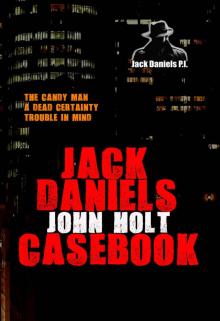 Jack Daniels - Casebook
Jack Daniels - Casebook A Case Of Murder (Kendall Book 6)
A Case Of Murder (Kendall Book 6)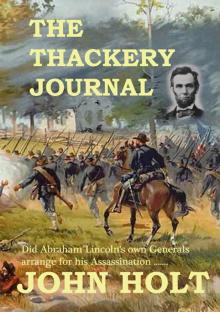 The Thackery Journal
The Thackery Journal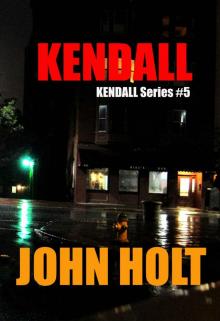 Kendall (Kendall Book 5)
Kendall (Kendall Book 5) Kendall - Private Detective - Box Set
Kendall - Private Detective - Box Set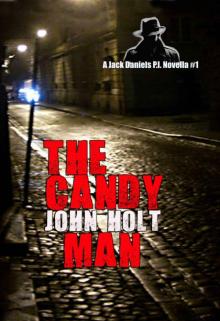 The Candy Man: A Jack Daniels P.I. Novella #1
The Candy Man: A Jack Daniels P.I. Novella #1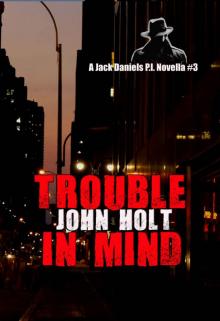 Trouble In Mind: Jack Daniels P.I. Novella #3
Trouble In Mind: Jack Daniels P.I. Novella #3 The Kammersee Affair
The Kammersee Affair